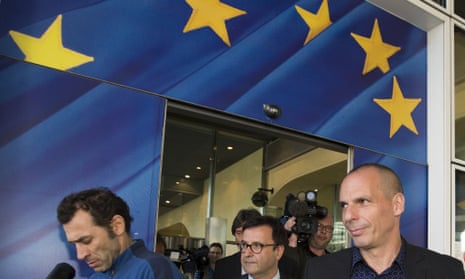Leading shares lost early gains to close sharply lower on a combination of concerns, including UK election jitters, Greece worries and disappointing US trade figures.
After climbing as high as 7053 as it played catch-up with Monday’s positive moves in Europe after being closed for the Bank Holiday, the FTSE 100 finished down 58.37 at 6927.58.
The falls came as European markets lost all of Monday’s gains and more on concerns that Greece would run out of cash before agreeing a deal with its creditors, with another deadline of next week’s eurogroup meeting looking set to pass without any agreement. The EU downgrading Greece’s growth prospects did not help.
On top of that the euro strengthened, putting pressure on equities, after a rising US trade deficit weakened the dollar.
A rise in oil prices to a six month high also hit sentiment, with Brent crude up more than 2% at $68 a barrel as Saudi Arabia kept its June prices unchanged for Asian buyers but raised them in Europe.
The prospect of dearer fuel costs sent British Airways owner International Airlines Group down 20.5p to 537p with cruise group Carnival 67p lower at £29.41.
But oil companies unsurprisingly moved higher, with BP up 6.35p at 474.95p and Royal Dutch Shell B shares 22p better at £21.20.
Elsewhere HSBC fell 20.4p to 625.9p despite better than expected first quarter results, as the bank warned the UK’s bank levy was preventing it from raising its dividends.
Lloyds Banking Group lost 0.46p to 82.41p despite upbeat comments from analysts, with Jefferies predicting the bank could spend up to £6bn on share buybacks to boost shareholder value. It said:
Investors are looking to invest in shares of banks which have de-risked, are returning capital, have positive earnings momentum and are easily understood. Lloyds is moving in the right direction on all counts and, for this reason, we believe the shares can appreciate to 102p. In addition to paying 12p of dividends for 2015-2017, we estimate around £6bn of excess capital could be used to repurchase shares. Upgrade to buy [from hold].
Exane BNP Paribas said it preferred Lloyds over Royal Bank of Scotland:
Looking five years ahead both Lloyds and RBS should be predominantly domestic UK banks focused on retail and commercial banking with limited, if any, government ownership. The journey to get there in the next couple of years is starting to look increasingly difficult for RBS, while it is smooth for Lloyds, assuming no overtly negative developments post the UK election on 7 May.
Elsewhere Tui put on 3p to £12.03 amid reports it might sell its Laterooms.com business.
But Imperial Tobacco fell 109p to £31.20 as Nomura issued a downbeat note:
We remain 3.5% and 5.5% below consensus for earnings per share for 2015 and 2016, respectively. This reflects what we see as a realistic balance of sales development (taking into account persist share loss in key markets) with gross cost inflation (needed to support expensive and risky brand transitions) and the impacts of medium-term cost saves and one-off profit impacts in 2014.
All our estimates reflect are pre the proposed US brand acquisition from Reynolds. We show that while accretion of the deal could be (optimistically) over 20%, our target price of 2710p would reflect a realistic valuation based on sustained gearing levels and the historic discount to BAT (average 30% last 5 years).
With the US deal outcome and execution still very uncertain and not much changed for the company since end 2013 in our view (except the loss of the Marlboro brand licence in the UK from end 2015 and the risk of falling behind new product technology), we remain reduce rated at these levels.
Among the mid-caps Invidior - the pharmaceuticals business spun out from Reckitt Benckiser - added 17.3p to 220.4p after positive results from a phase 3 trial for its treatment for schizophrenia.








Comments (…)
Sign in or create your Guardian account to join the discussion